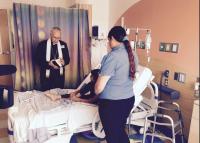Bishop Attends ICE Meeting For Mother
WASHINGTON (CNS) – After hearing about the plight of a cancer-stricken child whose mother was facing imminent deportation, a U.S. border bishop, Texas Bishop Mark J. Seitz of El Paso, paid the pair a visit at the hospital.
On Aug. 7, he prayed at a Texas hospital with bed-ridden 8-year-old Alia Escobedo, suffering from bone cancer, and her mother, Maria De Loera, the child's only caretaker, before heading to a meeting with immigration officials – a hearing in which the mother was to report for deportation but one which the bishop attended in her place.
"It was a pleasure to be able to meet them and hopefully bring a bit of a consolation to this young child," Bishop Seitz said. "They're amazingly resilient. This mom had her husband killed in (Ciudad) Juarez, escaped to El Paso running for her life. When she came here, her youngest daughter was diagnosed with bone cancer."
The last two and half years have been filled, not just with treatments at the hospital, but also with the threat of deportation. An asylum request De Loera filed in 2014 was denied the following year, and since then, she has been in the process of being removed from the country by immigration officials.
Bishop Seitz, along with other clergy, accompanied De Loera's lawyer to see officials from U.S. Immigration and Customs Enforcement, also known as ICE, "to reconsider … given the circumstances," he said.
He said he met with a case worker and a supervisor as well as other officials. "I think they were relatively receptive," he said.
On Aug. 8, ICE officials granted De Loera a six-month stay to continue watching over her daughter during treatment, said Dylan Corbett, executive director of the Hope Border Institute, which also has been involved calling in attention to the case.
"I'm concerned about the very fact that we had to intercede on behalf of this mother under these circumstances," Bishop Seitz said, because it shows that "even the most obvious humanitarian reasons for allowing a person to stay are no longer sufficient.”
"If any of us lived in a situation, in a country where there is extreme violence, we would do whatever it took to find a situation of safety, even if it meant crossing a border," he said. "We would do it if our children were starving. We wouldn't say 'I guess we'll just stay here and watch our children die.' Nobody would do that. We would do whatever we needed to do."




